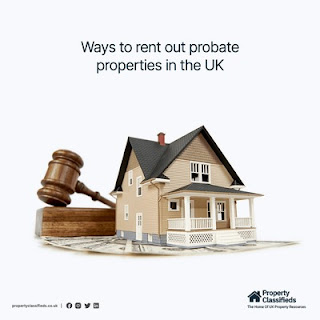Is There Any Way to Rent Probate Properties in the United Kingdom?
Renting probate properties in the United Kingdom is indeed possible, but it requires navigating a somewhat different process compared to renting traditionally owned properties. Probate properties are those that have become part of the probate process due to the death of the property owner, and they may be left to heirs or beneficiaries or even sold to settle debts or distribute assets. Here, we will explore how you can go about renting such properties in the UK.
Understanding Probate Properties:
Before delving into how to rent probate properties, it's important to understand what they are and the circumstances in which they become available for rent. Probate properties are essentially the real estate assets of a deceased individual. When a person passes away, their assets, including real estate, go through a legal process called probate to determine how these assets will be distributed among heirs or beneficiaries or used to pay off any outstanding debts or taxes.
During the probate process, a property may be left to heirs, sold to pay off debts, or included in the deceased's estate for distribution. In some cases, heirs or beneficiaries may choose to rent the property out rather than sell it. In such instances, these properties become available for prospective tenants.
Finding Probate Properties for Rent:
Locating probate properties available for rent in the UK can be a bit more challenging than finding traditional rental listings. Here are some steps to help you in your search:
Estate Agents: While estate agents primarily deal with property sales, some also manage probate properties for rent. Contact local estate agents, and inquire if they have any probate properties available or if they can keep you in mind for future listings.
Online Listings: Websites like Rightmove, Zoopla, and Gumtree can sometimes feature probate properties for rent. Use filters and search terms such as "probate rental" or "inheritance property for rent" to narrow down your search.
Public Notices: Local newspapers or official government publications might contain notices regarding probate properties. Keep an eye out for such announcements as they can lead you to available rental properties.
Networking: In some cases, personal connections can be a valuable resource. Let friends and family know you're interested in renting a probate property, and they might inform you if they come across any opportunities.
Probate Property Auctions: While not a traditional rental route, probate property auctions can be a way to acquire such properties for rent. Attend these auctions or work with a property auctioneer to explore potential opportunities.
Negotiating a Probate Property Rental:
Once you've identified a probate property for rent, you'll need to go through a somewhat different process compared to renting a standard property. Here's what you should expect:
Contact the Executor or Estate Agent: Reach out to the executor of the deceased's estate or the estate agent responsible for managing the property. Express your interest in renting the property and schedule a viewing.
Viewing the Property: Attend the viewing to assess the condition of the property and ensure it meets your needs. During the viewing, you can also ask questions about the rental terms, such as the monthly rent, security deposit, and any specific requirements.
Application and Screening: If you decide to move forward with renting the property, you'll typically need to complete a rental application and undergo tenant screening. This can include background checks and financial assessments.
Rental Agreement: Once you pass the screening and are approved as a tenant, you'll sign a rental agreement. Be sure to read this document thoroughly and seek legal advice if necessary to understand your rights and obligations.
Terms and Conditions: Be aware that probate properties may come with certain terms and conditions that differ from standard rentals. For example, the length of the rental may be subject to the probate process, and you may need to vacate the property if it's sold during this time.
Rent Payments: Ensure you understand the terms of rent payment and the schedule. Some probate properties may have different arrangements regarding rent payment.
Maintenance and Repairs: Clarify how maintenance and repairs will be handled. In some cases, the estate or executor may be responsible for certain repairs or maintenance tasks.
Legal Considerations:
Renting a probate property involves unique legal considerations. It's advisable to consult with a solicitor or legal expert to ensure you are fully aware of your rights and responsibilities as a tenant in a probate property. Additionally, it's important to understand that the probate process can be lengthy and may affect the duration of your tenancy.
In summary, renting probate properties in the United Kingdom is possible, but it may require some extra effort in terms of finding available listings and navigating the unique aspects of the probate process. Being well-informed and seeking legal guidance when necessary will help ensure a smooth and successful rental experience in such properties.




Comments
Post a Comment